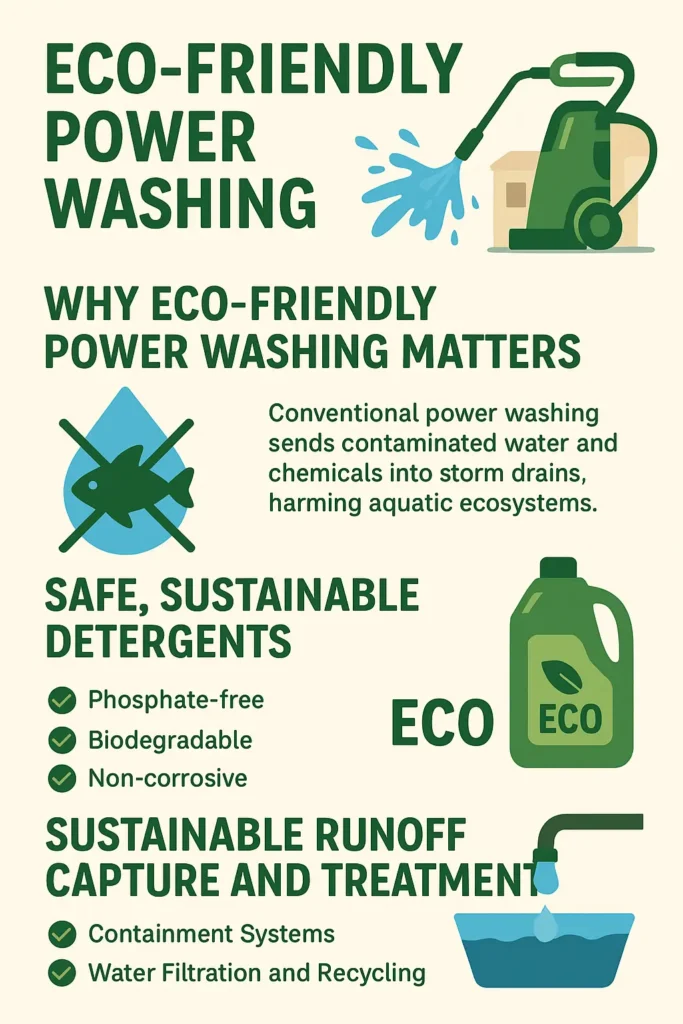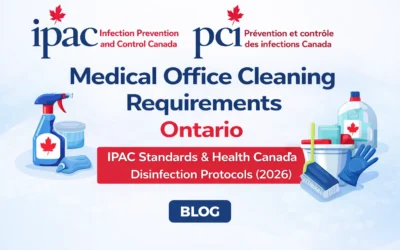A New Era of Clean: Sustainable Power Washing That Protects Water and Wildlife
Power washing is an essential service for maintaining the appearance and hygiene of buildings, sidewalks, vehicles, and outdoor spaces. But behind the gleam of a freshly washed surface lies a hidden environmental challenge: chemical runoff and water pollution.
Traditional detergents, loaded with phosphates and harsh surfactants, can harm aquatic ecosystems and degrade soil quality. Fortunately, eco-friendly power washing offers a cleaner, greener path — using biodegradable detergents, controlled water systems, and smart runoff management to achieve powerful results without environmental compromise.
Why Eco-Friendly Power Washing Matter
Conventional pressure washing often sends contaminated water — mixed with oils, heavy metals, and chemicals — straight into storm drains. These drains usually flow directly to rivers and oceans, bypassing filtration systems. The result? Toxic accumulation that harms marine life and violates environmental regulations.
Eco-friendly power washing solves this problem through two primary innovations:
- Safe, Biodegradable Detergents
- Sustainable Runoff Capture and Treatment
Together, they make cleaning both effective and ecologically responsible.
Safe Detergents: Power Meets Responsibility
The detergent is the heart of any power washing process — and the biggest opportunity to go green.
Traditional degreasers and surface cleaners rely on synthetic surfactants that don’t break down easily. Eco-friendly alternatives use plant-based ingredients like coconut oil derivatives, citric acid, or enzymes to lift dirt and grease while remaining non-toxic and biodegradable.
Characteristics of Safe, Sustainable Detergents
- Phosphate-free: Prevents algae blooms and protects waterways.
- Biodegradable: Breaks down naturally within 28 days or less.
- Non-corrosive: Gentle on equipment and building materials.
- Low VOC: Reduces harmful emissions and improves air quality.
Products with certifications such as EPA Safer Choice, Green Seal, or EcoLogo ensure compliance with environmental standards while maintaining cleaning efficiency.
Performance Without Pollution
Advancements in green chemistry have eliminated the trade-off between effectiveness and eco-safety. Today’s enzyme-based detergents are capable of breaking down oil, grease, and biological buildup as efficiently as chemical solvents — often with less residue and better results on porous surfaces like concrete and brick.
Runoff Management: Containing the Clean
Even the safest detergent can become a pollutant if runoff isn’t managed properly. Runoff from power washing often contains dirt, oils, and organic matter that can harm water systems when discharged into storm drains.
Best Practices for Runoff Control
- Containment Systems
Use portable berms, vacuum recovery mats, or booms to capture wash water before it reaches drainage areas. These systems are crucial for compliance under Clean Water Act regulations in the U.S. and similar global environmental laws. - Water Filtration and Recycling
Advanced mobile filtration units separate contaminants from wash water, allowing it to be reused safely. This process reduces total water use by up to 80%, aligning with sustainability goals and lowering utility costs. - Proper Disposal Protocols
Collected wastewater should be filtered and disposed of through sanitary sewer systems, not storm drains. Partnering with certified waste management providers ensures compliance and traceability. - Eco-Friendly Surface Pretreatment
Applying biodegradable degreasers before washing minimizes the need for high-pressure blasting and excessive water flow — further reducing runoff volume.
Integrating Sustainability into Power Washing Operations
Eco-friendly power washing is more than just a switch in products — it’s a shift in mindset. Businesses that adopt sustainable practices gain both regulatory advantages and reputational benefits.
1. Equipment Efficiency
Modern pressure washers equipped with adjustable PSI controls, low-flow nozzles, and heat recovery systems minimize resource consumption while improving performance.
2. Staff Training
Operators should be trained to:
- Dilute detergents correctly.
- Use containment mats efficiently.
- Recognize local runoff pathways.
- Dispose of wastewater safely.
These skills reduce both environmental impact and liability risk.
3. Transparent Sustainability Policies
Publicly sharing eco-washing protocols builds customer trust. Whether through signage, website content, or sustainability reports, transparency reinforces your brand’s commitment to responsible operations.

The Business Case for Going Green
Switching to sustainable detergents and runoff systems may seem costly upfront, but the long-term savings are undeniable. Eco-friendly power washing reduces product waste, equipment corrosion, and potential fines from environmental violations.
Key Economic Benefits:
- Lower Water Usage: Closed-loop filtration systems dramatically cut consumption.
- Reduced Equipment Wear: Non-corrosive cleaners extend machine lifespan.
- Avoided Fines: Compliance with EPA and municipal wastewater standards prevents penalties.
- Market Differentiation: Consumers increasingly prefer vendors aligned with environmental ethics.
By aligning with sustainability, power washing companies can attract eco-conscious clients and secure contracts with environmentally certified facilities.
Eco-Friendly Power Washing in Urban Environments
Cities face particular runoff challenges due to impermeable surfaces like asphalt and concrete. Sustainable power washing helps municipalities reduce stormwater pollution and support local green initiatives.
Some cities now require power washing businesses to use water reclamation systems and approved biodegradable detergents to maintain operating licenses. Adopting these practices early positions your business as a leader in urban environmental compliance.
Technological Innovation: Smarter Cleaning Ahead
The future of eco-friendly power washing is driven by technology and data. Smart monitoring sensors now track water usage, chemical ratios, and runoff quality in real time. AI-driven systems can automatically adjust detergent concentration based on surface type, reducing waste and improving consistency.
Emerging bio-enzyme technologies promise even cleaner breakdown of organic contaminants — replacing petroleum-based surfactants entirely. Combined with electric pressure washers and renewable energy, the cleaning industry is evolving toward zero-impact operations.
Conclusion: Cleaning with Conscience
Eco-friendly power washing proves that high performance and environmental care can coexist. By adopting safe detergents and responsible runoff management, cleaning professionals can protect the ecosystems that sustain their communities — while improving efficiency and customer satisfaction.
Sustainability isn’t just good ethics; it’s smart business. Every drop saved, every toxin avoided, and every system improved brings us closer to a future where cleaning leaves nothing behind but a better world.





